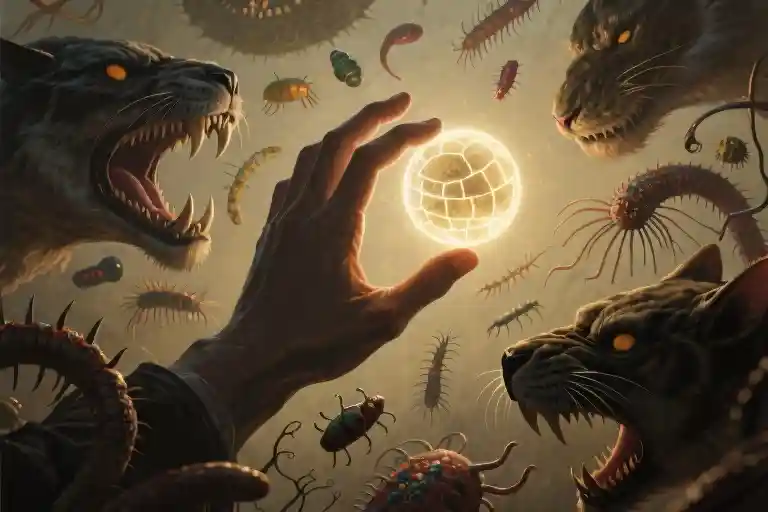The Sunday school answer came too easily: God is good, and all goodness flows from Him. It was the kind of tidy explanation that satisfies children before they learn to ask harder questions. Before they notice how lion cubs starve when the hunt fails, or how wasps lay eggs inside living caterpillars so their young can eat the host alive. Before the problem of evil sinks its teeth into their worldview.
We’re taught morality as if it were simple arithmetic—a divine equation where goodness equals God’s will. This explanation offers comfort in its clarity, like memorizing multiplication tables. But childhood arithmetic never accounted for the irrational numbers, the chaos lurking between the neat lines of our notebooks. Nature doesn’t do tidy explanations. A shark isn’t evil when it takes a seal pup, just as the malaria parasite isn’t wicked when it destroys a child’s red blood cells. The natural world operates beyond our moral categories, in a realm where suffering isn’t punishment—it’s just physics playing out.
Yet here we are, this peculiar species that washes its hands between acts of survival. We could dominate like alpha predators, yet we invent concepts like ‘fairness’ and ‘human rights.’ We document nature’s brutality in high-definition documentaries, then turn away from the screen disturbed by what we fundamentally are—animals who’ve developed the capacity to be ashamed of our own instincts. The cognitive dissonance hums beneath our daily lives: we know the universe operates without moral intent, yet we can’t stop imposing meaning onto its indifference.
This tension defines our modern condition more than any religious doctrine ever could. Our ancestors could attribute hurricanes to angry gods, but we watch weather satellites track the physics of destruction while scrolling through casualty reports. The problem of evil isn’t theological anymore—it’s the daily confrontation with a world that follows natural laws but no moral ones. And still, against all evolutionary logic, we keep trying to play the survival game by different rules. Not just to survive, but to deserve having survived.
Perhaps that’s the real miracle—not that some divine being handed us morality, but that we fragile, temporary creatures insist on inventing it anyway. That we stare into the Darwinian abyss and still pack first-aid kits. That we document parasitic wasps with one hand while building hospitals with the other. The universe may be merciless, but we remain stubbornly, inexplicably merciful—and that defiance might be our truest inheritance.
The Religious Shortcut to Morality
We inherit these stories without questioning them at first. “God is good” gets etched into young minds before we even understand what goodness means. It’s a comforting equation – divine perfection equals moral clarity. The Sunday school version of ethics fits neatly into a child’s palm: all virtues flow from a single sacred source, all vices represent deviations from that purity.
This theological arithmetic makes morality appear beautifully simple. Stealing isn’t wrong because it causes harm or violates social contracts – it’s wrong because God said so. Charity isn’t valuable because it alleviates suffering – it’s valuable because it pleases the divine accountant keeping cosmic score. The system works remarkably well until you encounter your first contradiction in the wild.
That moment usually comes early. A kitten gets hit by a car. A classmate’s parent dies suddenly. The problem of evil doesn’t arrive through philosophical discourse – it crashes into us through lived experience. Suddenly the equation falters. If goodness stems from an omnipotent creator, why does creation contain such gratuitous suffering? The theological shortcut to morality begins crumbling the first time a child asks why bad things happen to good people.
What makes this religious framework so fragile isn’t its inability to explain suffering – many theologians have constructed elaborate defenses around that paradox. The real weakness lies in how it outsources moral reasoning. When we attribute all goodness to divine commandment, we never develop the muscles for ethical thinking. We’re left unequipped when life presents moral gray areas that scripture never anticipated.
This becomes painfully apparent when examining nature’s indifference. The natural world operates without malice or mercy – concepts that only exist in minds capable of abstraction. A tsunami isn’t cruel when it drowns a village, just as sunlight isn’t kind when it nourishes crops. These events simply occur according to physical laws, untouched by human notions of morality. Yet religious explanations often force anthropomorphic qualities onto natural processes, creating unnecessary contradictions.
The religious shortcut fails precisely where we need moral guidance most – in situations where suffering occurs without perpetrators, where tragedy strikes without meaning. When faced with a child dying of leukemia or a parasitic wasp slowly consuming a caterpillar from within, “God works in mysterious ways” provides neither comfort nor understanding. These are the moments when prefabricated answers reveal their inadequacy, when we must either abandon moral questioning or begin the harder work of building an ethics that acknowledges life’s inherent chaos.
Perhaps the most damaging consequence of this theological approach is how it separates morality from observable reality. By locating virtue exclusively in the supernatural realm, it suggests that human beings lack innate moral capacity. This creates a false dichotomy between religious ethics and amoral naturalism, ignoring the abundant evidence of proto-moral behavior in animals and the evolutionary advantages of cooperation. We don’t need divine intervention to explain why empathy and fairness might emerge in social creatures – biology provides plausible pathways.
That’s not to say religious traditions lack value in moral development. Their stories and rituals have guided civilizations for millennia, preserving hard-won ethical wisdom across generations. But when these traditions claim exclusive ownership of morality, when they position themselves as the only bulwark against amorality, they do a disservice to human potential. We’re more ethically sophisticated than that – capable of moral reasoning that acknowledges both our biological heritage and our aspirational ideals.
The fragility of religious moral shortcuts becomes most apparent in their treatment of nature’s indifference. Unable to reconcile a benevolent creator with a food chain built on suffering, they often resort to theological contortions – claiming predation didn’t exist before some mythical fall, or that animals don’t truly suffer. These mental gymnastics reveal more about our need for comforting narratives than they do about the actual world we inhabit. A more honest approach would acknowledge that morality begins precisely where nature’s indifference ends – in our human refusal to accept suffering as inevitable.
The Unfeeling Machinery of Nature
We like to think of cruelty as something with intention behind it. A lion isn’t cruel when it tears into a gazelle – it’s simply hungry. Nature operates on this level of pure, unthinking necessity. There’s no malice in the way parasitic wasps lay their eggs inside living caterpillars, no sadism in the design that lets their larvae eat the host alive from the inside out. These aren’t acts of evil, just the cold mathematics of survival playing out.
The problem of evil becomes something entirely different when you remove the human tendency to anthropomorphize. Strip away the idea of some grand designer, and what remains is simply systems interacting – teeth meeting flesh, chemical signals overriding free will, one organism’s survival becoming another’s suffering. The natural world doesn’t operate on our moral spectrum. A mother octopus starving herself to death while tending her eggs isn’t noble sacrifice – it’s just what her biology demands. A male lion killing cubs that aren’t his own isn’t committing murder – he’s following evolutionary programming.
Some of the most unsettling examples come from parasites that rewrite their host’s behavior. There’s a fungus that infects ants, making them climb vegetation before sprouting through their heads to spread spores. Flatworms that drive their cricket hosts to drown themselves so the worms can reproduce in water. These aren’t horror stories – they’re standard operating procedure for countless species. The cruelty we perceive says more about our own moral frameworks than about nature itself.
What unsettles us most might be the sheer indifference. A deer dying slowly from an infected wound isn’t being punished for some sin – it’s just unlucky. A sea turtle choking on plastic isn’t receiving cosmic justice – it’s colliding with the consequences of human systems that operate with similar indifference. Nature doesn’t care about fairness, only function. The same processes that create breathtaking biodiversity also demand constant suffering as fuel.
Yet here we are – products of that same unfeeling system – insisting on concepts like justice and compassion. We judge nature by standards it never agreed to follow. Maybe that’s the real miracle – not that nature is cruel, but that creatures shaped by its merciless logic can imagine something different.
The Paradox of Human Morality
We watch nature documentaries with a peculiar fascination, that uneasy mix of horror and awe as lions drag down a gazelle. The blood matting their fur doesn’t shock us—this is simply how the world works. But then we switch off the television and help an elderly neighbor carry groceries up the stairs. This daily contradiction defines us: creatures who understand nature’s ruthlessness yet insist on acting against it.
Animals follow instinct without apology. A mother bear will abandon a cub if resources grow scarce; chimpanzees wage brutal territorial wars. Their morality, if we can call it that, operates on pure survival calculus. Yet humans? We invent concepts like “justice” and “charity.” We feel guilt over eating meat while knowing full well our canine teeth evolved for tearing flesh. This cognitive dissonance between what we are (animals) and what we aspire to be (moral agents) forms civilization’s foundational tension.
Three theories attempt to explain this anomaly:
- The Social Contract Myth
Early philosophers suggested morality as collective fiction—a necessary lie to prevent society from collapsing into chaos. But this feels inadequate when observing a stranger diving into freezing water to save a drowning child. No social contract explains such spontaneous self-sacrifice. - The Genetic Glitch
Some evolutionary biologists propose morality as accidental byproduct—like how moths evolved to fly toward moonlight (and now crash into lightbulbs). Perhaps empathy emerged as useful trait for tribal cohesion, then spiraled beyond its original function. Yet this reduces Mother Teresa’s actions to mere biochemical misfiring. - The Rebellion Hypothesis
Here’s a less clinical view: What if morality represents nature’s first successful mutiny against itself? Like a river carving its own new path, humans developed the ability to say “No” to evolutionary programming. The parasite forces its host to drown itself? We invent antibiotics. Survival demands stepping on weaker competitors? We build wheelchair ramps.
Modern life tests this rebellion daily. Corporate climbers face the temptation to sabotage colleagues; nations justify drone strikes with cold cost-benefit analyses. Yet even when we fail—when greed or fear wins—we still recognize the failure. That lingering discomfort proves the mutiny continues. A lion never feels ashamed of its full belly.
Perhaps morality isn’t about winning nature’s game at all, but changing the rules mid-play. Not clean hands versus bloody ones, but dirty hands that keep washing themselves. The parasite doesn’t hesitate; we hesitate constantly. That hesitation—that space between instinct and action—is where humanity flickers brightest.
The Dirty Secret of the Survival Game
We like to think we’ve risen above nature’s brutal calculus. Our boardrooms and courtrooms hum with talk of ethics, corporate social responsibility, fair trade. The language of morality drapes over our competitive instincts like a tailored suit over raw muscle. But sometimes the seams show.
Consider how quickly “industry standards” become excuses. The pharmaceutical executive justifying price gouging as “just business.” The tech founder shrugging at data exploitation because “everyone does it.” These aren’t parasitic wasps laying eggs in living hosts, yet the underlying logic feels disturbingly familiar – survival and propagation at any cost.
What’s fascinating isn’t the existence of corporate predation, but how meticulously we dress it in moral language. Annual reports boast sustainability initiatives while subsidiaries dump waste upstream. Marketing campaigns champion empowerment as algorithms maximize addiction. We’ve become experts at keeping our hands technically clean while the machinery beneath grows stickier.
This cognitive dissonance manifests in tiny personal choices too. That pang when you buy the cheaper item knowing its supply chain involves suffering. The mental gymnastics around eating meat while loving animals. We’re all complicit in systems we’d never design from scratch, yet can’t seem to escape.
Perhaps this is the true human anomaly – not that we behave morally, but that we feel compelled to justify when we don’t. No lion apologizes for the gazelle. No parasitic cordyceps fungus experiences ethical qualms about hijacking an ant’s nervous system. Our peculiar torment is wanting to believe we’re better while knowing, at some level, we’re still playing the same game.
The blood on our hands may be metaphorical rather than literal, but it stains nonetheless. We’ve simply replaced claws with contracts, fangs with fine print. The survival game continues, just with longer lag time between cause and effect. What parasites accomplish in days through chemical hijacking, we achieve over decades through subtle societal manipulation – all while telling ourselves this time it’s different.
Maybe that’s the most human thing of all: not whether we win clean, but that we keep trying to convince ourselves we can.
The Choice We Face
There’s a quiet tension in every moral decision we make, a whisper of that ancient question: do we play by nature’s rules or our own? The world operates on one set of principles – survival, replication, dominance – while we’ve somehow invented another. Mercy. Justice. Fair play. Concepts that would make no sense to a wasp laying its eggs in a living caterpillar.
We’ve built civilizations on these unnatural ideas, knowing full well the universe doesn’t care. Hospitals stand as monuments to our refusal to accept ‘survival of the fittest.’ Courtrooms testify to our bizarre insistence on fairness. Every act of unreciprocated kindness defies the cold logic of evolutionary advantage.
Yet the bloodstains remain. However carefully we wash our hands, traces of compromise linger under the nails. The factory farm that supplies our ethical organic market. The rare earth minerals in our protest signs. The uncomfortable truth that someone, somewhere always pays the price for our comfort.
This isn’t about guilt – that’s too simple. It’s about the daily choice to reach beyond what’s necessary. To give more than we take. To heal when we could harm. These choices don’t come from nature; they’re acts of rebellion against it.
So here we stand, flawed creatures in an unforgiving system, still trying to play a different game. Maybe that’s enough. Maybe the trying matters more than succeeding. The hands won’t stay clean, but we keep washing them anyway.
You’ll face this choice tomorrow, probably before lunch. Not in grand philosophical terms, but in whether to take the advantage or give the benefit of the doubt. Whether to crush or lift up. Whether to be what nature made you, or what you’ve decided to be.
No one can make that choice for you. But consider this: the lion never wonders if its face is bloody. That question belongs to us alone.





